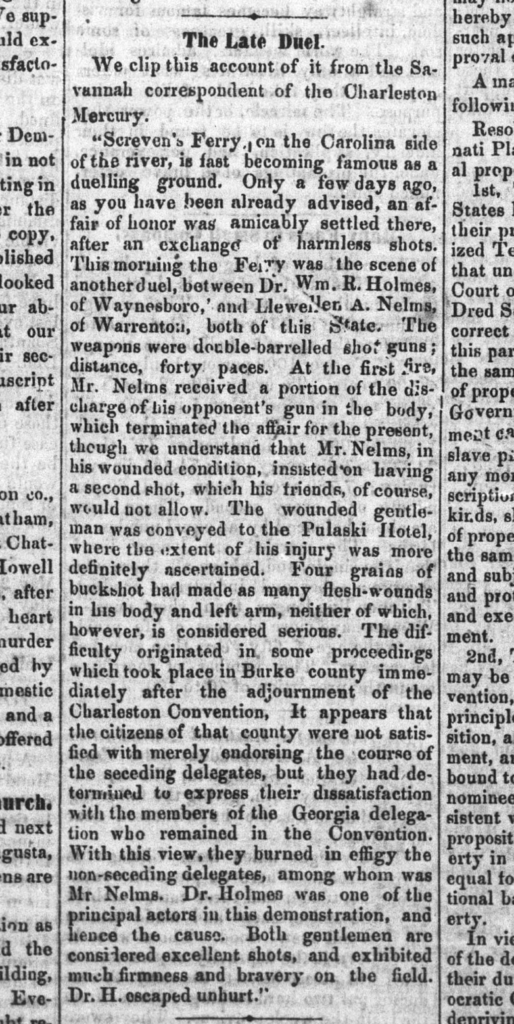The Late Duel
27 November 2021
Lieutenant Colonel William R. Holmes was killed in dramatic fashion at Sharpsburg on 17 September 1862 while in command of the 2nd Georgia Infantry. As the Georgian’s defense of the Lower Bridge over the Antietam began to collapse that afternoon, he ran down to the stream bank “and with a cry of defiance shook his sword in the faces of our men [Union troops across the creek] for a moment, and then fell pierced by a dozen bullets.”
The story below, from June 1860, suggests that “fire-breathing” spirit wasn’t a recent development.
_________________
The quote at the top about Holmes’ death is from Charles F. Walcott’s History of the Twenty-first Regiment, Massachusetts Volunteers … (1882). Walcott was Captain of Company B at Antietam, and he’s the narrator of the event.
The news piece about the duel is from the Planters’ Weekly (Greenesboro, GA) of 13 June 1860, and it’s online thanks to the Georgia Historic Newspapers database, a project of the Digital Library of Georgia. My transcription, with breaks for ease of reading, follows:
The Late Duel.
We clip this account of it from the Savannah correspondent of the Charleston Mercury.
“Screven’s Ferry, on the Carolina side of the river, is fast becoming famous as a dueling ground. Only a few days ago, as you have been already advised, an affair of honor was amicably settled there, after an exchange of harmless shots.
This morning tho Ferry was the scene of another duel, between Dr. William R. Holmes, of Waynesboro, and Llewellan A. Nelms, of Warrenton, both of this State. The weapons were double-barrelled shot guns; distance, forty paces. At the first fire, Mr. Nelms received a portion of the discharge of his opponent’s gun in the body, which terminated tho affair for the present, though we understand that Mr. Nelms, in his wounded condition, insisted on having a second shot, which his friends, of course, would not allow. The wounded gentleman was conveyed to the Pulaski Hotel, where the extent of his injury was more definitely ascertained. Four grains of buckshot had made as many flesh-wounds in his body and left arm, neither of which, however, is considered serious.
The difficulty originated in some proceedings which took place in Burke county immediately after the adjournment of the Charleston Convention. It appears that the citizens of that county were not satisfied with merely endorsing the course of the seceding delegates, but they had determined to express their dissatisfaction with the members of the Georgia delegation who remained in the Convention. With this view, they burned in effigy the non-seceding delegates, among whom was Mr Nelms. Dr. Holmes was one of the principal actors in this demonstration, and hence the cause. Both gentlemen are considered excellent shots, and exhibited much firmness and bravery on the field. Dr. H. escaped unhurt.”



Please Leave a Reply